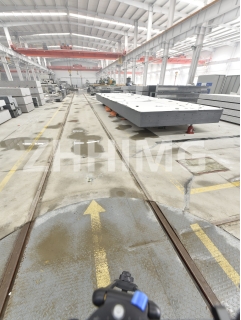The use of granite bed in semiconductor equipment is a common practice and is highly compatible with other materials. Granite is a durable and stable material that has excellent vibration-damping properties. It is an ideal material for the construction of beds in semiconductor equipment, especially for machines that require high levels of precision and accuracy.
Granite is highly resistant to thermal expansion, chemical corrosion, and wear and tear. This means that it can withstand the harsh conditions that typically exist in a semiconductor manufacturing environment. Due to its high thermal stability, granite beds maintain their shape and flatness over a wide temperature range, ensuring consistent and accurate results during semiconductor manufacturing.
The compatibility of granite with other materials is also excellent. It can be easily machined and polished to a high precision, allowing it to be used in conjunction with other materials in semiconductor equipment. The use of granite beds in semiconductor equipment has been proven to improve the accuracy and repeatability of semiconductor production processes.
Moreover, granite beds are also easy to maintain. Unlike other materials such as steel or aluminum, granite is resistant to rust and does not corrode easily. This means that it requires minimal maintenance, reducing downtime and production losses.
Granite beds also offer excellent rigidity and stability, which is crucial in semiconductor equipment. The high rigidity of granite means that it can support heavy loads without flexing or bending, ensuring that semiconductor equipment operates with high accuracy and precision.
In conclusion, the use of granite beds in semiconductor equipment is highly compatible with other materials. Its physical, chemical and mechanical properties make it an ideal material for use in semiconductor manufacturing equipment. Its resistance to thermal expansion, chemical corrosion, and wear and tear, make it a durable and stable material that can withstand the harsh conditions of a semiconductor manufacturing environment. This enhances the accuracy and repeatability of semiconductor production processes, making it an essential material in the semiconductor industry.
Post time: Apr-03-2024

